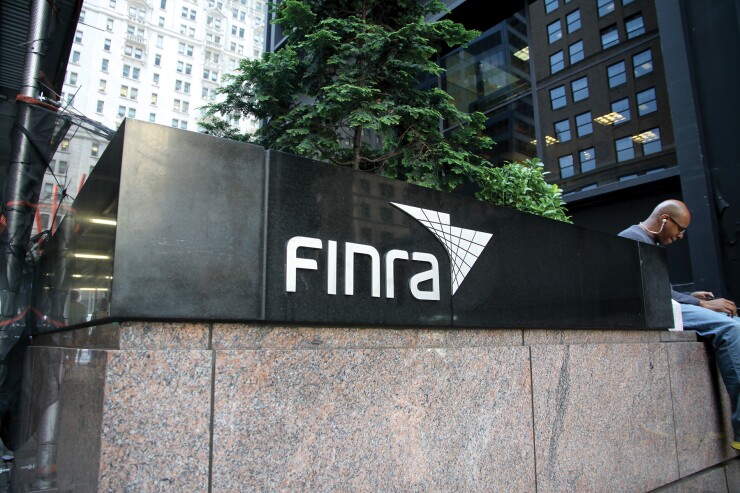
Clients poured money into a hedge fund billed as a safe investment backed by a computer algorithm. It was anything but, authorities say.
Two advisors allegedly misled their clients into investing in a fund that they created which then went disastrously south, losing 80% of its value in a single month, according to FINRA, which permanently barred the advisors from the industry on Thursday.
The Wall Street regulator says that ex-advisors Timothy S. Dembski and Walter F. Grenda misrepresented the hedge fund to clients. The two advisors told clients that the fund – which they created with a third person not named in FINRA's disciplinary action – was based on a computer algorithm that had been tested and that it included stop-losses. The fund would purportedly sell individual stock positions daily when the share price rose by 3% or dropped by 1% before 3 p.m., according to FINRA.
However, the Prestige Wealth Management Fund – in which clients started investing in March 2011 – was not based on any computer algorithm, the alleged testing never took place and, in fact, the fund's chief investment officer had complete discretion, FINRA says.
Despite what clients were told, it was in fact was a speculative investment, according to FINRA.
MILLIONS LOST
The Buffalo, N.Y.-based advisors recommended the fund to clients who had limited investing experience; some of those clients used retirement assets or surrendered variable annuities in order to invest in the fund, FINRA says.
Dembski's clients invested approximately $4 million while Grenda's clients invested another $8 million, according to the SEC, which filed charges against the advisors last year.
The fund failed to deliver the positive returns as advertised, leading Grenda to withdraw his clients in October 2012, according to the SEC.
His attorney, Joseph Makowski, confirmed that Grenda "pulled his clients out due to the lack of performance in the fund."
"He was not an officer or a director in the fund, nor did he have any equity interest in the Prestige fund. And none of Mr. Grenda’s clients have pursued any action against him nor have any sought any relief in any FINRA arbitration proceeding," the Buffalo-based attorney added.
In November 2012, the fund's total assets stood at about $3.4 million, according to FINRA. A month later, the assets dropped to approximately $644,000.
FINRA says that the marketing materials created by Dembski and Grenda were also misleading. The materials described the CIO, who was not named by FINRA, as a professional with 15 years of experience and as someone who managed a portfolio of $500 million – neither of which were true.
During the time of alleged wrongdoing, both advisors were registered with Mid Atlantic Capital, a Pittsburgh-based broker-dealer with more than 500 registered representatives. The firm did not respond to requests for comment.
Dembski and Grenda neither admitted nor denied the charges, but consented to the entry of FINRA's findings.
Dembski's attorney, Paul Batista, noted that FINRA action did not include any fines, but the cost of fighting the FINRA complaint would have been too high for his client.
"Mr. Dembski's decision to consent to the FINRA proposal was motivated, in substantial part, by the prospect of paying many thousands of dollars in legal and other fees to defending himself in a FINRA-sponsored hearing that would have consumed at least two months of his and his attorneys' time and effort," Batista said in a statement.
Batista said Dembski was not involved in the creation of the investment formula used by the hedge fund.
"Regrettably, a relatively small number of Mr. Dembski's many investment clients did place money in the hedge fund – which again is a risky investment fund that in writing stresses that an investor can lose all of his or her investment," Batista said.
Grenda's attorney, Makowski, also notes that no fines were imposed upon his client.
"In 2015, FINRA barred nearly 500 brokers from the securities industry and we will continue to root out those brokers who seek to take advantage of their customers," Brad Bennett, FINRA's chief of enforcement, said in a statement.
The SEC also barred Grenda from the industry while SEC charges against Dembski are still pending, according to FINRA BrokerCheck records.
Dembski's attorney said FINRA's action was a "classic case of piling on."
"Both the FINRA and SEC proceedings have to be evaluated against an exemplary, more-than-two-decade career of Mr. Dembski during which he successfully managed funds entrusted to him by dozens of local Buffalo residents," Batista said.
Read more:
-
Fiduciary Rule in Final Stages -
Amid Falling Profits, Advisors Bolt from Oppenheimer -
SEC Plans to Expand Staff to Increase Advisor Examinations





